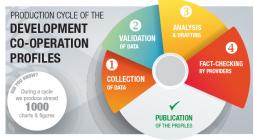Fossil fuel support is rising again in a threat to climate change efforts.
Fossil-fuel subsidies are environmentally harmful, costly, and distortive. After a 3 years downward trend between 2013 and 2016, government support for fossil fuel production and use has risen again, in a threat to efforts to curb greenhouse gas emissions and air pollution, and the transition to cleaner and cheaper energy. Support across 76 countries increased by 5% to USD 340 billion in 2017, according to a new OECD-IEA report prepared for the G20.
OECD-IEA Update on Recent Progress in Reform of Inefficient Fossil Fuel Subsidies that Encourage Wasteful Consumption also shows that even in the group of 44 OECD and G20 countries, where fossil fuel support is still declining, the reduction has slowed down. Support in these countries was down 9% in 2017, a slower decline than the 12% recorded in 2016 and 19% in 2015.
The reversal comes as some countries reinstated stronger price controls on fossil fuels, in response to volatility in international oil prices, which made it harder to continue energy pricing and taxation reforms.
Some progress has nonetheless been made: the report finds that many countries, including Argentina, India, Indonesia and several Middle Eastern and Northern African economies, have continued to take steps to reduce support for energy consumption. Western Europe has completed its phasing out of hard-coal subsidies and efforts continue to end state aid to coal-fired power generation in the European Union.
Oil and gas industries in several countries, however, continue to benefit from government incentives, mostly through tax provisions that provide preferential treatment for cost recovery. Such policies go against domestic efforts to reduce emissions.
The report was presented to G20 energy officials ahead of the G20 Ministerial Meeting on Energy Transitions and Global Environment in Karuizawa, Japan, where countries reiterated their commitment to phasing out inefficient fossil fuel subsidies and encouraged countries that have not done so to volunteer for a Peer Review.
“This new OECD-IEA report signals a worrying slowdown in our efforts to phase out fossil fuel subsidies,” said OECD Secretary-General Angel Gurría. “The critical nature of the climate change crisis has never been clearer than it is today. Countries should be accelerating their reforms, not taking their feet off the pedal. We cannot promote inclusive and sustainable growth if we continue subsidising fossil fuels!”
The report combines the IEA’s price-gap approach to capture the transfer to consumers of policies that keep fossil fuels below reference prices and the OECD’s 2019 Inventory of Support Measures for Fossil Fuels, which takes stock of spending programmes and tax breaks used in the 36 OECD countries and eight emerging countries (Argentina, Brazil, China, Colombia, India, Indonesia, Russia and South Africa) to encourage fossil fuel production or use. These include measures that reduce prices for consumers or that lower exploration and exploitation costs for oil and gas companies.
Increasing transparency on the use of scarce public resources can help to keep up momentum for fossil fuel subsidy reform. Building on the evidence brought to the table by the OECD, G20 countries committed in Pittsburgh in 2009 to “rationalise and phase out over the medium term inefficient fossil fuel subsidies that encourage wasteful consumption.” Since then G20 countries – China, Germany, Indonesia, Italy, Mexico and the United States – have completed voluntary G20 Peer Reviews of inefficient fossil fuel subsidies, and Argentina and Canada are just starting theirs. The OECD has been asked to play Secretariat role for all the country reviews, to chair and facilitate these processes, which have to date evaluated more than 100 government interventions relating to the production and use of fossil fuels.
“OECD evidence leaves no doubt” says Gabriela Ramos, OECD Chief of Staff and G20 Sherpa - “inefficient fossil fuel subsidies undermine global efforts to tackle climate change, aggravate local pollution, and are a strain on public budgets, draining scarce fiscal resources that could be invested in education, skills, and physical infrastructure. We urge all G20 countries to keep up the effort, and join the voluntary G20 Peer Reviews of inefficient fossil fuel subsidies.”
Download a PDF of Update on Progress in Reform of Inefficient Fossil Fuel Subsidies
See the OECD Inventory of Support Measures for Fossil Fuels 2019
See more OECD work on fossil fuel subsidies
For further information journalists are invited to contact the OECD Media Office (+33 1 45 24 97 00.)
Working with over 100 countries, the OECD is a global policy forum that promotes policies to improve the economic and social well-being of people around the world.
*Attached the OECD database brochure
OECD





